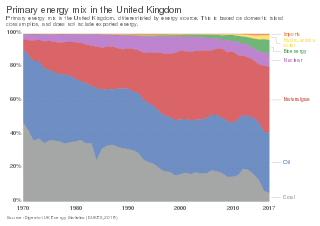Related Research Articles

Scottish Power Limited, trading as ScottishPower, is a vertically integrated energy company based in Glasgow, Scotland. It is a subsidiary of Spanish utility firm Iberdrola.

The National Grid is the high-voltage electric power transmission network supporting the UK's electricity market, connecting power stations and major substations, and ensuring that electricity generated anywhere on the grid can be used to satisfy demand elsewhere. The network serves the majority of Great Britain and some of the surrounding islands. It does not cover Northern Ireland, which is part of the Irish single electricity market.
The Renewables Obligation (RO) is a market support mechanism designed to encourage generation of electricity from eligible renewable sources in the United Kingdom. There are three related schemes for the three legal jurisdictions of the UK. In April 2002 the Renewables Obligation was introduced in England and Wales, and in Scotland as the Renewables Obligation (Scotland). The RO was later introduced in Northern Ireland in April 2005. In all cases, the RO replaced the Non-Fossil Fuel Obligation which operated from 1990.

The Office of Gas and Electricity Markets (Ofgem), supporting the Gas and Electricity Markets Authority, is the government regulator for the electricity and downstream natural gas markets in Great Britain. It was formed by the merger of the Office of Electricity Regulation (OFFER) and Office of Gas Supply (Ofgas).
National Grid plc is a British multinational electricity and gas utility company headquartered in London, England. Its principal activities are in the United Kingdom, where it owns and operates electricity and natural gas transmission networks, and in the Northeastern United States, where as well as operating transmission networks, the company produces and supplies electricity and gas, providing both to customers in New York and Massachusetts.

Western Power Distribution is a trade name formerly used by four electricity distribution companies in the United Kingdom: WPD South West, WPD South Wales and WPD Midlands. Each company was the distribution network operator for its respective region. Western Power Distribution, which had headquarters in Bristol, served approximately 7.7 million customers in its combined distribution areas. In 2022 the company was absorbed into its new parent company, National Grid.

The energy policy of the United Kingdom refers to the United Kingdom's efforts towards reducing energy intensity, reducing energy poverty, and maintaining energy supply reliability. The United Kingdom has had success in this, though energy intensity remains high. There is an ambitious goal to reduce carbon dioxide emissions in future years, but it is unclear whether the programmes in place are sufficient to achieve this objective. Regarding energy self-sufficiency, UK policy does not address this issue, other than to concede historic energy security is currently ceasing to exist.
The Non-Fossil Fuel Obligation (NFFO) refers to a collection of orders requiring the electricity distribution network operators in England and Wales to purchase electricity from the nuclear power and renewable energy sectors. Similar mechanisms operated in Scotland and Northern Ireland.

SSE plc is a multinational energy company headquartered in Perth, Scotland. It is listed on the London Stock Exchange, and is a constituent of the FTSE 100 Index. SSE operates in the United Kingdom and Ireland.

Solar power has a small but growing role in electricity production in the United Kingdom.

The availability and uptake of green electricity in the United Kingdom has increased in the 21st century. There are a number of suppliers offering green electricity in the United Kingdom. In theory these types of tariffs help to lower carbon dioxide emissions by increasing consumer demand for green electricity and encouraging more renewable energy plant to be built. Since Ofgem's 2014 regulations there are now set criteria defining what can be classified as a green source product. As well as holding sufficient guarantee of origin certificates to cover the electricity sold to consumers, suppliers are also required to show additionality by contributing to wider environmental and low carbon funds.
Neta may refer to:
The New National Consumer Council, operating as Consumer Futures, was a non-departmental public body and statutory consumer organisation in England, Wales, Scotland, and, for postal services, Northern Ireland. It was established by the Consumers, Estate Agents and Redress Act 2007, and began operations in 2008 by the merging of Postwatch, Energywatch and the Welsh, Scottish and National Consumer Councils under the Consumer Focus brand.

OVO Energy is a major energy supplier based in Bristol, England.

UK Power Networks (UKPN) is a distribution network operator for electricity covering South East England, the East of England and London. It manages three licensed distribution networks which together cover an area of 30000 square kilometres and approximately eight million customers.

The National Grid covers most of mainland Great Britain and several of the surrounding islands, and there are interconnectors to Northern Ireland and to other European countries. Power is supplied to consumers at 230 volts AC with a frequency of 50 Hz. In 2023 about a third of electricity used in Britain was generated from fossil gas and two-thirds was low-carbon power. Wind generates the most low-carbon power, followed by nuclear some of which is imported from France. The government is aiming for greenhouse gas emissions from electricity in Britain to be net zero by 2035.

The Electricity Act 1989 provided for the privatisation of the electricity supply industry in Great Britain, by replacing the Central Electricity Generating Board in England and Wales and by restructuring the South of Scotland Electricity Board and the North of Scotland Hydro-Electric Board. The Act also established a licensing regime and a regulator for the industry called the Office of Electricity Regulation (OFFER), which has since become the Office of Gas and Electricity Markets (OFGEM).
The Western HVDC Link is a high-voltage direct current (HVDC) undersea electrical link in the United Kingdom, between Hunterston in Western Scotland and Flintshire Bridge in North Wales, routed to the west of the Isle of Man. It has a transmission capacity of 2,250 MW and became fully operational in 2019.
The Big Six were the United Kingdom's largest retail suppliers of gas and electricity, who dominated the market following liberalisation in the late 1990s. By 2002, six companies – British Gas, EDF Energy, E.ON, RWE npower, Scottish Power and SSE – had emerged from the 15 former incumbent monopoly suppliers.
An interconnector is a structure which enables high voltage DC electricity to flow between electrical grids. An electrical interconnector allows electricity to flow between separate AC networks, or to link synchronous grids. They can be formed of submarine power cables or underground power cables or overhead power lines.
References
- ↑ The review of the first year of NETA. A review document: Volume 1. Ofgem. July 2002
- ↑ The new electricity trading arrangements in England and Wales - Second Report of Session 2003–04. House of Commons Committee of Public Accounts, 16 December 2003
- ↑ Ofgem archive on BETTA